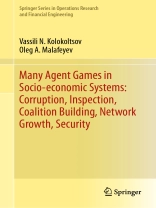There has been an increase in attention toward systems involving large numbers of small players, giving rise to the theory of mean field games, mean field type control and nonlinear Markov games. Exhibiting various real world problems involving major and minor agents, this book presents a systematic continuous-space approximation approach for mean-field interacting agents models and mean-field games models. After describing Markov-chain methodology and a modeling of mean-field interacting systems, the text presents various structural conditions on the chain to yield respective socio-economic models, focusing on migration models via binary interactions. The specific applications are wide-ranging – including inspection and corruption, cyber-security, counterterrorism, coalition building and network growth, minority games, and investment policies and optimal allocation – making this book relevant to a wide audience of applied mathematicians interested in operations research, computer science, national security, economics, and finance.
قائمة المحتويات
1. Introduction: Main Models and LLN Methology.- Part I: Multi-agent Interaction and Nonlinear Markov Games.- 2. Best Response Principals.- 3. Dynamic Control of Major Players.- 4. Models of Growth Under Pressure.- Par II: Pools of Rational Optimizers.- 5. MFGs for Finite-state Models.- 6. Three State Model of Corruption and Inspection.- 7. Four State Model of Cyber-security.- 8. Turnpick Theory for MFGs on Two-dimensional Networks.
عن المؤلف
Vassili N. Kolokoltsov is a Professor with the Department of Statistics, University of Warwick. During his career he held various research and teaching positions in Russia, Germany, France, Mexico and UK. He received the St. Petersburg University award for ‘Research Work in 2011’ for the book Understanding Game Theory, written jointly with O. A. Malafeyev.Oleg A. Malafeyev is the Head of the Department of Mathematical Modeling at St. Petersburg University (Faculty of Applied Mathematics and Control Processes). He is author of more than 200 research works, and several lecture notes, textbooks, and monographs regarding games and mathematical modeling. He received the St. Petersburg University award for ‘Research Work in 2011’ for his book
Understanding Game Theory, written jointly with V. N. Kolokoltsov.












